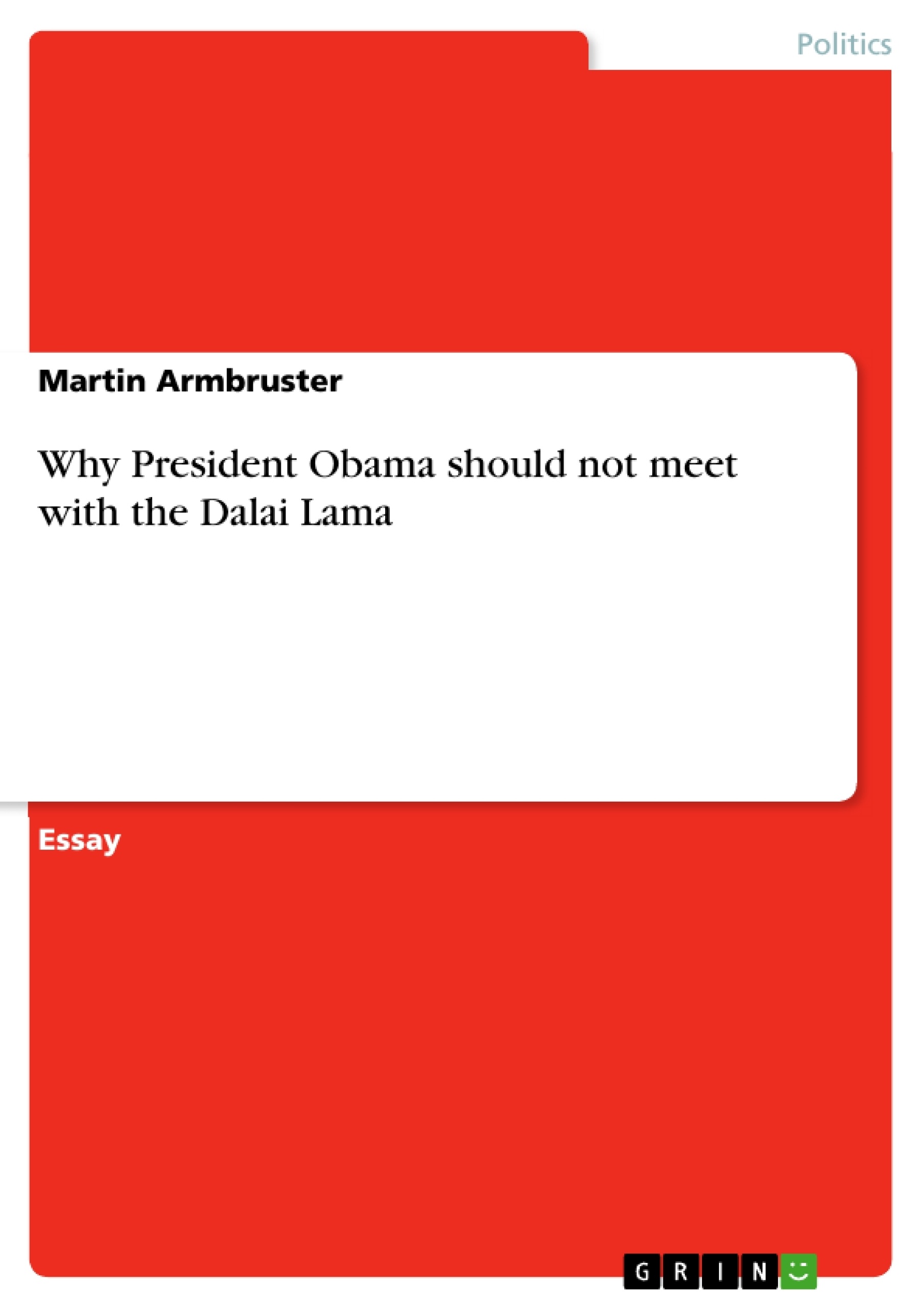With Barack Obama as the new President of the United States, a new charismatic figure has entered the stage of world politics. In the first months of his term, President Obama has repeatedly expressed his willingness to improve America’s relations with non-democratic countries (such as China or several Islamic countries). According to several of his statements, the President’s foreign policy toward non-democratic countries should be based on common interests and mutual respect. The President further stated that the wanted to listen, not to dictate. Concerning Sino-U.S. relations one could argue that this approach is mainly aimed at issues of common interests (such as economic issues between the U.S. and the PRC), while issues regarding human rights are left outside. Given America’s strong commitment to human rights and democracy, however, it is unlikely that any U.S.-President could afford a foreign policy where human rights issues were to be neglected. This paper addresses the question whether President Obama should meet with the Dalai Lama in order to support the struggle for Tibetan autonomy and to improve the PRC’s human rights record in Tibet. That is an important question to ask because it reflects a basic dilemma in U.S. foreign policy: the contrast between American values and American interests. From an idealist standpoint, the United States should pursue a foreign policy which promotes American core values (like freedom, democracy, and egalitarianism). From a more hard-nosed―one could say realist―standpoint, however, U.S. foreign policy should first and foremost serve American core interests. That also counts for the question raised above. While idealists surely would love to see the President with the Dalai Lama, pragmatics would rather see such a meeting as a threat to American interests in East Asia as it could strain Sino-U.S. relations.
On the pages below, I will argue that President Obama should not meet with the Dalai Lama. He should not do so due to three reasons. First, a meeting between the President and the Dalai Lama would strain Sino-U.S. relations (arguably the most important relations of the U.S. in the years to come). Secondly, it could prompt Beijing to take an even harder stance on the Tibet Question which could invoke a spiral of violence in the Tibetan areas. Finally, such a meeting would undermine a more effective diplomatic approach on the Tibet issue.
Inhaltsverzeichnis (Table of Contents)
- The Primacy of stable Sino-U.S. Relations
- Preventing a Spiral of Violence
- Effective Diplomacy instead of Meeting the Dalai Lama
Zielsetzung und Themenschwerpunkte (Objectives and Key Themes)
This position paper argues that President Obama should not meet with the Dalai Lama, focusing on the potential negative consequences for Sino-U.S. relations and the possible escalation of violence in Tibet. The paper explores the complexities of U.S. foreign policy in East Asia, particularly in the context of the Tibet Question.
- The Importance of Stable Sino-U.S. Relations
- The Potential for Increased Violence in Tibet
- The Effectiveness of Diplomatic Approaches
- The Balance Between American Values and Interests
- The Role of the Dalai Lama in Tibetan Politics
Zusammenfassung der Kapitel (Chapter Summaries)
The paper begins by outlining the sensitive nature of the "Tibet Question" and its impact on Sino-U.S. relations. It highlights how meetings between Western leaders and the Dalai Lama are often perceived by Beijing as interference in their internal affairs. The paper argues that such meetings could strain Sino-U.S. relations, jeopardizing cooperation on issues of mutual interest. It further suggests that a meeting with the Dalai Lama could escalate violence in Tibet, prompting a harsher crackdown by the PRC. The paper then presents a case for effective diplomacy as a more constructive approach to resolving the Tibet issue, encouraging dialogue between the PRC and the Tibetan Government in Exile. It emphasizes the importance of the Dalai Lama's non-violent stance and the potential for a negotiated solution that addresses both the PRC's territorial integrity and the Tibetan people's desire for cultural and political autonomy.
Schlüsselwörter (Keywords)
The paper focuses on the key themes of Sino-U.S. relations, the Tibet Question, the Dalai Lama, the PRC's human rights record, and the potential for violence in Tibet. The paper discusses the interplay of American values and interests in the context of East Asian foreign policy, emphasizing the role of diplomacy in finding a peaceful resolution to the Tibet issue.
Frequently Asked Questions
Why is the "Tibet Question" sensitive for Sino-U.S. relations?
Beijing views Tibet as an internal affair and considers meetings between U.S. presidents and the Dalai Lama as interference in China's sovereignty.
What is the main argument against President Obama meeting the Dalai Lama?
The paper argues it would strain vital Sino-U.S. relations, potentially provoke a harsher crackdown in Tibet, and undermine more effective diplomatic channels.
What is the "Idealist vs. Realist" dilemma in U.S. foreign policy?
Idealists promote American values like human rights, while realists prioritize core national interests, such as economic stability and stable relations with major powers like China.
Could a meeting with the Dalai Lama increase violence in Tibet?
The paper suggests that such a high-profile meeting might prompt Beijing to take a harder stance, which could invoke a spiral of violence and repression in Tibetan areas.
What is suggested as a more effective diplomatic approach?
Encouraging direct dialogue between the PRC and the Tibetan Government in Exile to find a solution that respects China's integrity while granting Tibetans cultural autonomy.
- Quote paper
- Martin Armbruster (Author), 2009, Why President Obama should not meet with the Dalai Lama, Munich, GRIN Verlag, https://www.grin.com/document/198350



